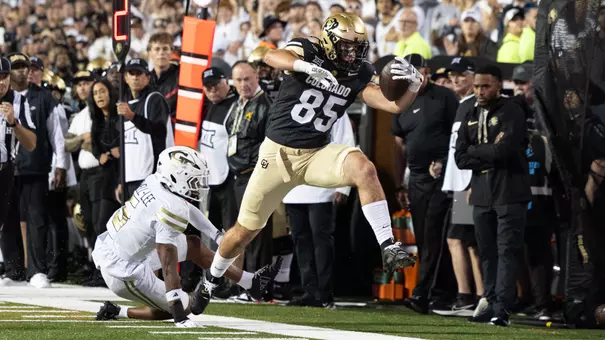Colorado University Athletics

Woelk: Five Takeaways From Mel Tucker's First Weeks At Buffs Helm
December 24, 2018 | Football, Neill Woelk
BOULDER — New Colorado coach Mel Tucker hasn't been on the job for a month. He doesn't have his entire staff in place, and his first practice won't be conducted until mid-March, when the Buffs are scheduled to open spring drills.
But after several press conferences and countless interviews, plus interviews with his new coordinators, there are already some trends beginning to take shape as we look ahead to the Tucker Era in Boulder.
Our first five takeaways as to what the Buffaloes might look like under their new head coach:
1. Explosion plays will be an emphasis. While there's no strict definition for the term, most college statisticians call an explosion play one of 20 yards or more. More often than not — especially in the world of college football — they are the difference in games.
The Buffs were a perfect example last season. In their five wins, the Buffs averaged 5.8 explosion plays per game on offense, with two explosion touchdowns per game. In their seven losses, the number of explosion plays dropped to 3.8 and the explosion touchdowns fell to just one per game.
It was the same story on defense. Colorado yielded 46 explosion plays last year, with 12 of those resulting in touchdowns. Eight of those explosion touchdowns came in CU's losses.
It's why, when asked about his defense, new coordinator Tyson Summers said, "It's a defense that's going to be very fundamentally sound and is going to be able to attack and create big plays — takeaways — while not giving up explosive plays."
It's why, when asked about his offense, new coordinator Jay Johnson said, "In the simplest of terms, if we convert a third down, we get three more chances. The more chances you get, the more chances you have for explosive plays. When you have explosive plays, that lends itself to winning football."
And it is why Tucker has said repeatedly that his defense will make opponents earn every yard while not giving up big plays and his offense will create explosive plays at every opportunity.
2. The Buffs will do their best to exert their will in the run game. From the day he landed in Boulder, Tucker made it clear he wants his offense to have the ability to pick up tough yards on the ground.
It's not something the Buffs have been especially effective at doing over the last few seasons. Last year, Colorado was just 19-for-32 on conversion attempts of third-and-3 or less, and just 9-for-23 on fourth-down tries.
"We have to be stout in the trenches," Tucker said. "We have to be able to move people, we have to be able to run the ball on our terms."
Tucker also has spoken repeatedly about having linemen who "are strong at the point of attack that love to play the game" and who can "move a man against his will."
He evidently plans on doing it with more than one running back carrying the ball. "How many big backs can we get?" he asked on signing day. "How many big backs can we put on the field, can we rotate in, can we be fresh and come at them in waves in the backfield? That's what we're looking for. We want guys that can run, yards after contact, yards after catch, dependable in pass pro."
There's no doubt where Tucker's point of reference originates. Two years ago at Georgia, he watched Nick Chubb (1,388 yards rushing) and Sony Michel (1,240 yards) pound opponents in tandem. This year, it was D'Andre Swift (1,037 yards) and Elijah Holyfield (956).
It won't happen overnight. But there's no doubt Tucker's last two college stops (Alabama and Georgia) have convinced him there's still room to run the ball in the college game.
3. The passing game will still be important. Tucker and Johnson will by no means ignore the wealth of wide receiver talent on CU's roster. Both are both disciples of balance. Georgia this year rushed for 3,271 yards and passed for 2,953 yards. The pass game is where those explosive plays happen.
In fact, Tucker has made it clear he wants to expand Colorado's weaponry in the passing game. When he announced that CU had signed Auburn grad transfer tight end Jalen Harris, he noted that the tight end will "be used extensively" in Colorado's offense.
Again, his Georgia background is an indicator. This year, the Bulldogs' third-leading receiver was tight end Isaac Natua, who caught 29 passes for 427 yards and three scores. All told, Bulldogs tight ends this year accounted for 39 catches for 552 yards.
In contrast, Colorado's tight ends caught six passes for 56 yards all season.
"We really need to use the tight end," Tucker said. "The tight end, when used properly, can give the defense fits."
4. Tucker wants to rule the trenches. In an era when offenses do their best to spread the field and get players in space and defenses use every imaginable scheme to contain them, there is still one commonality in college football:
The teams that win the battles up front are the teams that thrive. It is why Tucker's first recruiting class included eight linemen (four offense and four defense) and why he pursued size and strength at every possible juncture.
"You'll see our defensive linemen and our offensive linemen, they will finish," Tucker promised. "That's one of the things you look for. Not just being able to start a block, but to sustain and finish at the point of attack."
Tucker learned the value of dominating the line of scrimmage in the SEC. The strategy is no secret — every college team strives to attain that domination — but Tucker coached in a league where it has been perfected.
"Big guy. You're going to hear me say that a lot," Tucker said on signing day.
"We need big guys on the offensive line, on the defensive line. This is what we're looking for. … Up front, size and athleticism are critical for us."
Defensively, the Buffs will remain in a 3-4 base scheme, but they will adjust to down and distance — and in today's game, that means adjusting to the spread offenses that have become the rage, particularly in the Pac-12. Tucker noted that means Colorado could be in a nickel or dime package as much as "90 percent of the time" — which puts even more of a premium on defensive linemen who can alter the plays up front.
5. The tone will be set in spring ball. From the day he arrived, Tucker made it clear he's not here to rebuild. He was hired with the understanding that athletic director Rick George expects to win immediately, and Tucker has embraced those expectations.
On his first day in Boulder, Tucker said, "As of right now, we're a no-excuse operation here." It means the first session of offseason strength and conditioning will be intense; the first session of spring ball will be a crash course in changing the attitude and environment of the team.
Of course, every new head coach promises to improve the culture of a team. But Tucker's no-nonsense approach has already hit home in the Champions Center and players are eager to see what's ahead.
This could be as important of a spring ball session as the Buffs have seen in years.
Tops on the list will be learning new schemes on both sides of the ball, along with the requisite new terminology. At the same time, Tucker and his staff will evaluate every player on the current roster with a fresh set of eyes. What happened last year doesn't matter.
What will matter is how quickly the Buffs adapt, learn and embrace Tucker's style. It will mean hours in the film room, a dedication to the weight room and a willingness to take on the challenge Tucker and his staff will present.
More than once, Tucker has stressed "the cupboard isn't bare." He has already met with a number of Buffs, and will continue those meetings as soon as players return for the spring semester.
One thing he will make clear? Expectations go both ways. Mel Tucker was hired under the expectation that he will not have to endure a rebuilding period. But there's no doubt he will let the Buffs know he expects them to hold up their end of that bargain as well — and it starts immediately.
Contact: Neill.Woelk@Colorado.edu






